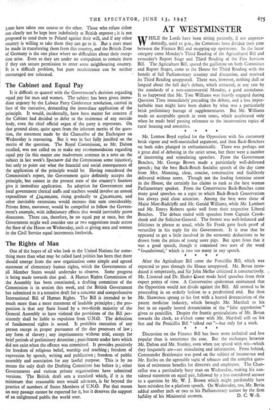The Rights of Man
One of the hopes of all who look to the United Nations for some- thing more than what may be called hard politics has been that there should emerge from the new organisation some simple and agreed statement of elementary human rights, which the Governments of all Member States would undertake to observe. Some progress is being made towards that goal. A Human Rights Commission of the Assembly has been constituted, a drafting committee of the Commission is in session this week, and the British Government has submitted to it a tentative draft for a concrete and comprehensive International Bill of Human Rights. The Bill is intended to be much more than a mere statement of laudable principles ; the pro- position is that any State found by a two-thirds majority of the General Assembly to have violated the provisions of the Bill per- sistently shall be liable to expulsion from U.N.O. The definition of fundamental rights is sound. It prohibits execution of any person except in proper pursuance of the due processes of law ; any form of slavery ; any imprisonment without trial, except for brief periods of preliminary detention ; punishment under laws which did not exist when the offence was committed. It provides positively for freedom of religious belief, worship and teaching ; freedom of expression by speech, writing and publication ; freedom of public assembly and association for any lawful purpose. This is by no means the only draft the Drafting Committee has before it ; other Governments and various private organisations have submitted versions. The British draft sets a standard which, if it is the minimum that reasonable men would advocate, is far beyond the practice of numbers of States Members of U.N.O. For that reason an easy passage cannot be expected for it, but it deserves the support of an enlightened public the world over;


































 Previous page
Previous page